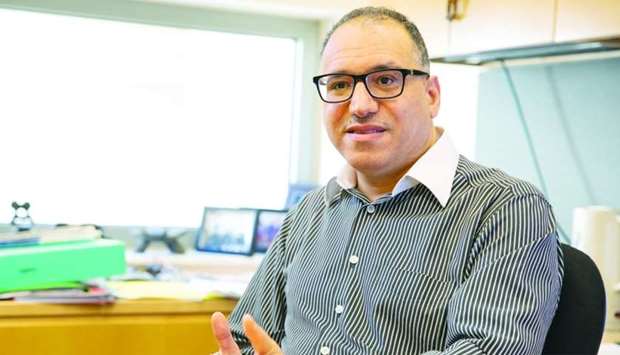Using face masks may not necessarily offer full protection against coronavirus and is not recommended for people with no symptoms of a flu like-illness, according to Dr Laith Abu-Raddad, professor of Healthcare Policy and Research at Weill Cornell Medicine-Qatar, a Qatar Foundation partner university.
“Of particular concern is the mishandling of face masks and the resulting frequent face touching which could increase the risk for an uninfected person to contract the virus,” he said.
“The use of masks is therefore not recommended unless the person is showing flu-like symptoms such as coughing and sneezing.
“It is reassuring that despite thousands of tests on people with flu-like or respiratory illnesses in Qatar, very few turned out to be infected with the coronavirus. The rapid governmental response in finding cases, isolating them, identifying their contacts, and testing them, and the precautionary measures undertaken – even if they led to disturbances to daily routine – are all to ensure containment of the virus, a strategy that has been working in Qatar where the outbreak remains under control.”
Dr Abu-Raddad emphasised that containing this virus is a collective responsibility of people and governments.“We will not be able to control the coronavirus spread unless every person becomes engaged and follows the prevention recommendations,” he said.
“This is an unusual epidemic that requires every person to act with responsibility and co-operate with the other people and the public health authorities.”
According to Dr Abu-Raddad, there is “a lot of misinformation” surrounding coronavirus, which is “feeding a culture of fear, if not panic”, he added.
“Fear usually occurs when people do not understand what is happening, or in this case do not really know what this virus is all about,” he said.
“However, we know what the coronavirus is, how it is transmitted, and what the level of risk is in Qatar. So there is no need to panic as transmission between members of the community remains limited.
“It is also the flu season, and there are other cold viruses circulating, which can cause symptoms similar to those caused by the coronavirus.
With this in mind, if anyone does show symptoms, it is unlikely that they are infected with the coronavirus, but rather with other common cold viruses.”
He also emphasised that people should only refer to credible news sources and official social media accounts for reliable information, saying: “The statistics and numbers related to the coronavirus in Qatar are being constantly updated and made available to the public as they occur, and this should be reassuring for everyone."
Dr Abu-Raddad explained that the danger posed by the coronavirus lies in it being more infectious than a typical cold virus, and that it can lead to serious disease in some people.
For example, for seasonal influenza, each infected person will on average infect 1.3 other persons, while each person infected with the new coronavirus will on average infect 2.2 other persons.
However, around 80% of those who contract the coronavirus will only suffer from a mild infection similar to a usual cold infection, 14% will show severe symptoms and may require hospitalisation, and only 6% will develop critical, life-threatening symptoms. Currently, the death rate from coronavirus, using data obtained from China, is about 2-4%.
“It is more dangerous than the usual seasonal flu, which causes death in only 0.1% of cases,” said Dr Abu-Raddad.“However, most deaths are occurring among the elderly population and persons already suffering from health complications.”
While the level of risk in Qatar remains on the low side, and the government is making every effort to rapidly contain the infection, the need remains for people need to act responsibly.
And Dr Abu-Raddad says that, rather than using masks, there are better ways of avoiding the infection.
“Social distancing – that is, avoiding close contact with others by keeping a one-meter distance, avoiding large gatherings and crowded places – and regular hand and face washing, are measures proven to be far more effective in reducing the risk of acquiring the virus than face masks,” he said, adding that people showing flu-like symptoms should isolate themselves immediately and seek healthcare assistance by contacting the toll-free national hotline at 16000.
Many research centres around the world are currently working on developing a vaccine against this coronavirus, and Dr Abu-Raddad said: "Several candidates for vaccine and antiviral drugs are already available, but these will require extensive testing prior to their approval for wide-scale use in a population, and this is a lengthy process that may extend over more than a year.
"We need time to reach fundamental solutions. In the meantime, we need to take measures that can contain the virus and reduce its chances for further spread as much as possible.”

